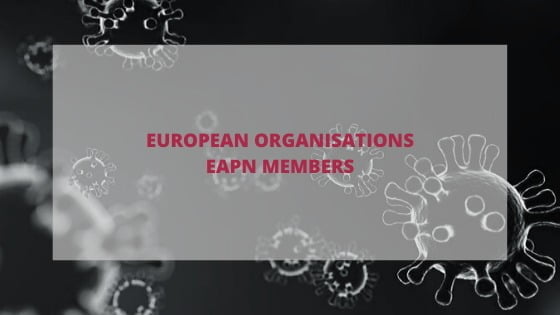EAPN and its members are concerned by the spreading of the Corona virus (COVID-19) across Europe and in particular about its social and economic consequences on people at risk of poverty and social exclusion and their families, but also highly vulnerable groups. Find here all the initiatives that the European Organisations (Members of EAPN) have taken:
- AGE Platform Europe published:
- on 16 March 2020 a statement calling for life-saving measures based on broad interventions and paying attention to the risk of social isolation and loneliness, compiling good practices of AGE members on national level.
- on 19 May 2020 an updated version of the report on COVID-19 and human rights concerns for older persons
- on 27 May 2020 a press release in reaction to the statement (20 May) of the Council of Europe’s Human Rights Commissioner, Dunja Mijatović on the impact of COVID-19 on long-term care facilities.
- on 3rd June a new report on the recovery from COVID-19 and how it should address the structural causes that have led to the de-prioritisation of older people during COVID-19.
- on 9 June an interview about the de-prioritisation of older people during the pandemic and what measures are necessary to provide adequate support.
- on 11 June a letter to the EU Vice-President Šuica as well as Commissioners Schmit and Kyriakides calling for EU action in the field of long-term care.
- on 15 June an alerts in a press release that elder abuse has been on the rise during the pandemic.
- on 1 July with the European Disability Forum, and the European Federation of Public Service Unions a letter asking the European Parliament for an investigation to assess the failures in addressing and managing the COVID-19 crisis in the long-term care sector across the European Union
- on 3 August its response to the European Semester
- Eurodiaconia published
- on 24 March 2020 a paper providing information about the experience and observations of their member organisations who are at the forefront of the fight against the disease and a set of policy recommendations aimed at supporting social service providers at regional, national and European levels to ensure that people living at the margins of society are not left behind in these unusually challenging times.
- on 19 June 2020 a press release calling on the EU and national governments to ensure support for the development and expansion of Humanitarian Corridors (HC), which provide additional and durable solutions to international and humanitarian protection needs while also facilitating the social inclusion of its beneficiaries. . A video of Hanna’s story, a Syrian refugee arrived in Italy thanks to the corridors is also attached to this press release. The video is in English and Italian, with English subtitles.
- Eurochild published
- on 25 March 2020 a statement on the challenges that Covid-19 will caused for children especially those living in poor housing. A dedicated ressource page has been also created.
- on 13 July 2020 a statement urging EU leaders to take action against growing child poverty in EU recovery plan and budget
- on a response to the EU Recovery Fund expressing their disappointment for the missed opportunity to not earmarked resources to the fight against child poverty under the European Council Conclusions on the EU’s Recovery Package and the EU’s budget and urging the European Parliament to tackle child poverty and champion children’s rights.
- European Network Against Racism (ENAR):
- published a statement calling for an immediate change to achieve real equality
- developed an interactive map of cases across Europe highlighting the impact of Covid-19 on racialized communities in a range of areas, including healthcare, housing, police violence, racist violence and speech.
- published a position paper highlighting the impact of Covid19 on racialised communities in a range of areas, including policing, and calling on the EU and Member States to change their approach and focus on structural racism in anti-racism policies.
- European Food Banks Federation (FEBA):
- disclosed on 17 March 2020 a statement calling on European Institutions and National Governments to support the initiatives of civil society organisations, signal solidarity to European citizens, especially to the most deprived and allow freedom of movement to volunteers aged 18-64 engaged with civil organisations
- published a report SDGs and Partnerships: How to tackle the COVID-19 today and tomorrow together
- launched at the end of March 2020a European COVID-19 Social Emergency Fund, an effort to secure the activity of European Food Banks and address the social emergency today and in the future.
- published on 15 April 2020 a Report “Challenges and urgent needs of European Food Banks during Covid-19”
- published the first international joint statement together with Feeding America and Global FoodBanking Network calling for an urgent, strengthened and sustain action to support the activity of Food Banks globally.
- European Federation of National Organisations Working with the Homeless (FEANTSA) published on 18 March a statement calling on public authorities at local, regional, national and European levels to work with homeless service providers to ensure that resources and attention flow to measures to meet the special requirements of people experiencing homelessness in the context of the COVID-19 pandemic.
- International Federation of Social Workers (IFSW) has created a webpage gathering information from their members on how as Social workers, they are responding to the crisis.
- Platform for International Cooperation on Undocumented Migrants (PICUM) also released on 20 March their statement calling for urgent measures to protect people and mend the cracks in our health, social protection and migration systems.
- SMES-Europa also produced a statement underlying that the COVID 19 crisis has exposed health and welfare systems that have ignored the socially excluded citizens.



